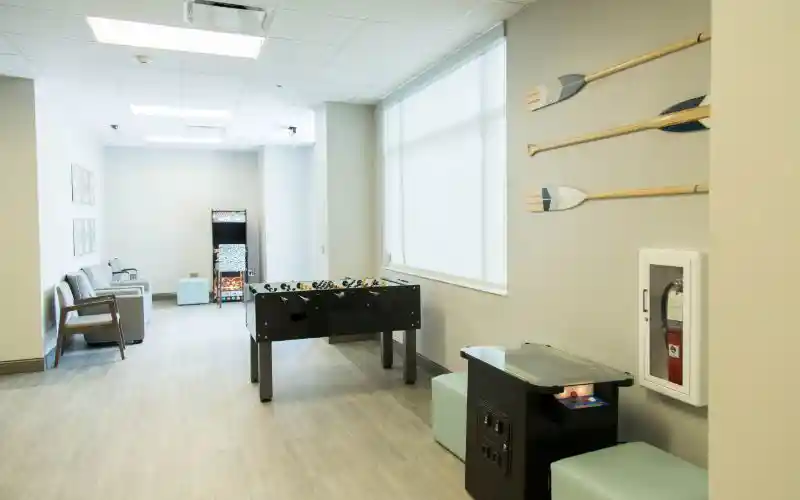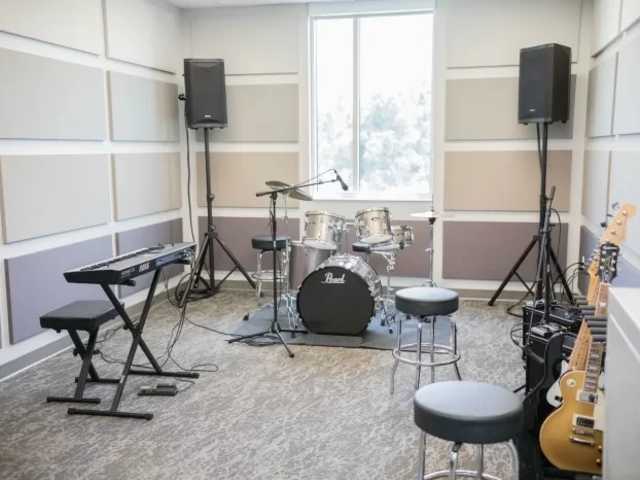Wilmington, North Carolina, United States
Wilmington Treatment Center
Verified
Verified
This provider’s information has been quality-checked by Recovery.com’s Research Team for accuracy and completeness, including center verification through appropriate third-party organizations.
Joint Commission Accredited
The Joint Commission accreditation is a voluntary, objective process that evaluates and accredits healthcare organizations (like treatment centers) based on performance standards designed to improve quality and safety for patients. To be accredited means the treatment center has been found to meet the Commission's standards for quality and safety in patient care.
Provider's Policy
Please call our admissions team for more information on insurance coverage. A knowledgeable member of our team can answer any financial questions you might have, and they can also reach out directly to your insurance carrier to verify and maximize your benefits. This service is free and puts you under no obligation to choose our programming.
Estimated Cash Pay Rate
The cost listed here ($25,000 ) is an estimate of the cash pay price. Center pricing can vary based on program and length of stay. Contact the center for more information. Recovery.com strives for price transparency so you can make an informed decision.
About Wilmington Treatment Center
Wilmington Treatment Center treats various addictions and co-occurring mental health conditions. As a licensed hospital, they also offer treatment for chronic pain. They tailor each treatment plan to the individual needs of the client, including detox services. Wilmington Treatment Center’s clinical and non-clinical staff oversee all aspects of treatment to create a safe and structured recovery experience. Their levels of care include residential treatment, day treatment, intensive outpatient, and aftercare services.
Evidence-Based Treatment from Professionals
Wilmington Treatment Center’s staff includes masters-level clinicians, addiction counselors, an addiction medicine specialist, registered nurses, physician assistants, and recreational therapists. Therapists lead individual and group therapies, focusing on group therapy throughout treatment. Their evidence-based therapies include cognitive behavioral therapy (CBT), 12-Step education, eye movement desensitization and reprocessing therapy (EMDR), and art therapy. Wilmington Treatment Center also provides holistic therapies like yoga, auricular acupuncture, Reiki, yoga, Qigong, and mindfulness practices.
Specialized Recovery Programs
Wilmington Treatment Center provides a unique treatment program for veterans, first responders, and active military members. Operation Recovery unites clients with shared experiences and conditions, like post-traumatic stress disorder (PTSD) and occupational trauma. Wilmington Treatment Center also offers a specific treatment track for young adults (19-30) and middle adults (30+). They provide weekly family education groups for loved ones and a monthly 3-day family program.
Multiple Levels of Care
Wilmington Treatment Center’s levels of care include residential treatment, a partial hospitalization program (PHP)/day treatment, and an intensive outpatient program. In PHP, clients can continue to live at Wilmington Treatment Center. In IOP, clients live at home and come to treatment 4 days a week, with day (9-12am) and evening (6-9pm) availability. In aftercare, clients meet weekly for group therapy and join a thriving alumni community.
Read More

Insurance Accepted
Provider's Policy:Please call our admissions team for more information on insurance coverage. A knowledgeable member of our team can answer any financial questions you might have, and they can also reach out directly to your insurance carrier to verify and maximize your benefits. This service is free and puts you under no obligation to choose our programming.
Operation Recovery Program
Wilmington Treatment Center’s Operation Recovery program provides a unique setting for military, veterans, and first responders to recover from addiction and co-occurring PTSD. Their treatment professionals have experience treating military and first responders. In the Operation Recovery program, clients meet with others for group therapy and engage in therapies like EMDR and cognitive processing therapy (CPT).
Treating Co-Occurring Conditions
Along with primary addiction, Wilmington Treatment Center treats co-occurring conditions like depression, anxiety, bipolar disorder, and PTSD. As a licensed hospital, they can also treat clients with complicated medical needs. They tailor treatment to treat mental health conditions and addiction simultaneously, helping clients get to the root of addiction and learn effective coping strategies.
Detox And Residential Care
Wilmington Treatment Center provides medically monitored detox from alcohol, opioids, benzodiazepines, and more. They use medication-assisted treatment (MAT) as needed and offer auricular acupuncture to relieve withdrawal symptoms. Wilmington Treatment Center’s residential treatment provides 24/7 care and a structured environment to begin recovery. Clients can enjoy on and off-site recreation, including beach outings, ice skating, and water activities.
Day Treatment And IOP
Clients can continue to live on-site in Wilmington Treatment Center’s day treatment program. Day treatment offers a less intensive, more independent stage of recovery. Clients can then transition into IOP, where they’ll live at home and come to treatment 4 days a week (Monday, Tuesday, Thursday and Friday). Each day includes 3 hours of treatment. On Wednesdays, Wilmington Treatment Center hosts aftercare group therapy and a women-only group.

Center Overview
Estimated Cash Pay Rate

Treatment Focus
This center treats primary substance use disorders and co-occurring mental health conditions. Your treatment plan addresses each condition at once with personalized, compassionate care for comprehensive healing.

Care Options








Treatment
Specializations
Alcohol
Using alcohol as a coping mechanism, or drinking excessively throughout the week, signals an alcohol use disorder.
Detox
Detox fully and safely removes toxic substances from the body, allowing the next steps in treatment to begin with a clean slate.
Depression
Symptoms of depression may include fatigue, a sense of numbness, and loss of interest in activities. This condition can range from mild to severe.
Drug Addiction
Drug addiction is the excessive and repetitive use of substances, despite harmful consequences to a person's life, health, and relationships.
Medication-Assisted Treatment
Combined with behavioral therapy, prescribed medications can enhance treatment by relieving withdrawal symptoms and focus patients on their recovery.
Post Traumatic Stress Disorder
PTSD is a long-term mental health issue caused by a disturbing event or events. Symptoms include anxiety, dissociation, flashbacks, and intrusive thoughts.
Veterans
Patients who completed active military duty receive specialized treatment focused on trauma, grief, loss, and finding a new work-life balance.
Residential
In a residential rehab program, patients live onsite, with access to daily treatment and 24-hour care. An average stay is 30-90 days.
Approaches
Evidence-Based
A combination of scientifically rooted therapies and treatments make up evidence-based care, defined by their measured and proven results.
Medical
Medical addiction treatment uses approved medications to manage withdrawals and cravings, and to treat contributing mental health conditions.
Twelve Step
Incorporating spirituality, community, and responsibility, 12-Step philosophies prioritize the guidance of a Higher Power and a continuation of 12-Step practices.
Therapies
1-on-1 Counseling
Patient and therapist meet 1-on-1 to work through difficult emotions and behavioral challenges in a personal, private setting.
Trauma-Specific Therapy
This form of talk therapy addresses any childhood trauma at the root of a patient's current diagnosis.
Art Therapy
Visual art invites patients to examine the emotions within their work, focusing on the process of creativity and its gentle therapeutic power.
Expressive Arts
Creative processes like art, writing, or dance use inner creative desires to help boost confidence, emotional growth, and initiate change.
Eye Movement Therapy (EMDR)
Lateral, guided eye movements help reduce the emotional reactions of retelling and reprocessing trauma, allowing intense feelings to dissipate.
Family Therapy
Family therapy addresses group dynamics within a family system, with a focus on improving communication and interrupting unhealthy relationship patterns.
Life Skills
Teaching life skills like cooking, cleaning, clear communication, and even basic math provides a strong foundation for continued recovery.
Music Therapy
Singing, performing, and even listening to music can be therapeutic. Music therapy sessions are facilitated by certified counselors.
Recreation Therapy
In recreation therapy, recovery can be joyful. Patients practice social skills and work through emotional triggers by engaging in fun activities.
Reiki
Hand placements or light touches over the body aim to strengthen patients' life energy, guided by a Reiki therapist with expertise in this Eastern medicine.
Conditions We Treat
Anxiety
Anxiety is a common mental health condition that can include excessive worry, panic attacks, physical tension, and increased blood pressure.
Bipolar
This mental health condition is characterized by extreme mood swings between depression, mania, and remission.
Depression
Symptoms of depression may include fatigue, a sense of numbness, and loss of interest in activities. This condition can range from mild to severe.
Post Traumatic Stress Disorder
PTSD is a long-term mental health issue caused by a disturbing event or events. Symptoms include anxiety, dissociation, flashbacks, and intrusive thoughts.
Trauma
Some traumatic events are so disturbing that they cause long-term mental health problems. Those ongoing issues can also be referred to as "trauma."
Substances We Treat
Alcohol
Using alcohol as a coping mechanism, or drinking excessively throughout the week, signals an alcohol use disorder.
Benzodiazepines
Benzodiazepines are prescribed to treat anxiety and sleep issues. They are highly habit forming, and their abuse can cause mood changes and poor judgement.
Chronic Relapse
Consistent relapse occurs repeatedly, after partial recovery from addiction. This condition requires long-term treatment.
Co-Occurring Disorders
A person with multiple mental health diagnoses, such as addiction and depression, has co-occurring disorders also called dual diagnosis.
Cocaine
Cocaine is a stimulant with euphoric effects. Agitation, muscle ticks, psychosis, and heart issues are common symptoms of cocaine abuse.
Drug Addiction
Drug addiction is the excessive and repetitive use of substances, despite harmful consequences to a person's life, health, and relationships.
Heroin
Heroin is a highly addictive and illegal opioid. It can cause insomnia, collapsed veins, heart issues, and additional mental health issues.
Methamphetamine
Methamphetamine, or meth, increases energy, agitation, and paranoia. Long-term use can result in severe physical and mental health issues.
Opioids
Opioids produce pain-relief and euphoria, which can lead to addiction. This class of drugs includes prescribed medication and the illegal drug heroin.
Aftercare
Experience
Personal Amenities
Amenities
Special Considerations
First Responders Program
Paramedics, police officers, firefighters, and others join in a specific First Responders program, usually focused on trauma, grief, and work-life balance.
Young Adults Program
Programs for young adults bring teens 18+ together to discuss age-specific challenges, vocational and educational progress, and successes in treatment.
Activities
Off-Site Activities
Professional Staff

Bernard Gottschalk
Medical Director
M.D. FASAM

Amy Merritt
Director of Nursing
MSN, RN

Micah Elrod
Assistant Director of Nursing
BSN, RN

Lauren F. Vick
Clinical Director
MS, CRC, LCAS, LCMHC, CCS, LCMHC-S
View More Team Members
We love hearing about your treatment experience
Help individuals and families seeking treatment by sharing your first-hand experience with this treatment provider. Review Guidelines.



































